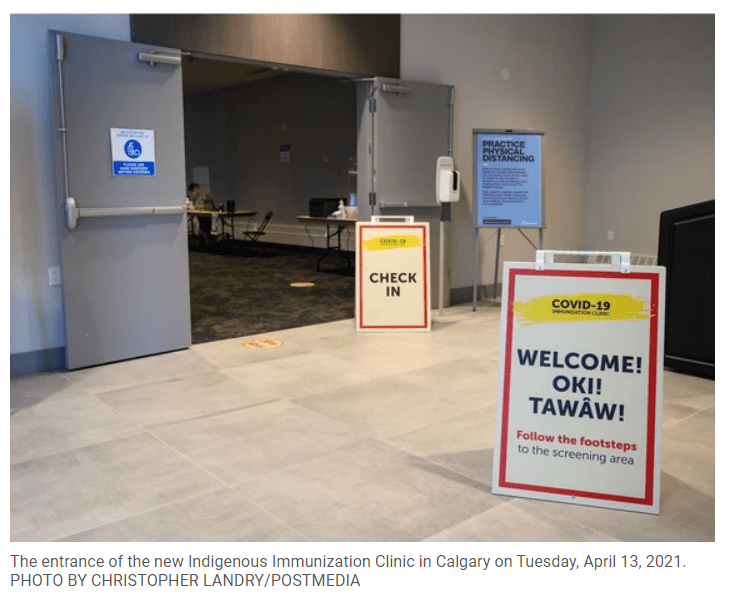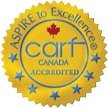

An Indigenous-led immunization clinic has expanded its efforts to include younger Indigenous people, newcomers, refugees and migrant workers following the success of its Phase 2 vaccinations
Following the success of an Indigenous-led immunization clinic’s Phase 2 vaccinations, efforts are expanding to include younger Indigenous people, newcomers, refugees and migrant workers.
It is the third project led by a coalition of organizations, which include the Aboriginal Friendship Centre of Calgary (AFCC), Siksika Health Services, OKAKI and Seven Brothers Circle, that prioritizes cultural safety and counters vaccine misinformation.
The group opened an immunization centre for Indigenous seniors in March at the Circle of Wisdom Elders and Seniors Centre in Sunalta. Then in April, it launched a large-scale Phase 2 clinic at the Best Western Premier Calgary Plaza Hotel & Conference Centre.
As of Monday, the hotel-based clinic opened its door to individuals 12 and older. The coalition has also partnered with the Métis Nation of Alberta — Region 3, Calgary Catholic Immigration Society (CCIS) and the Calgary Homeless Foundation to increase its reach.
Elders Reg Crowshoe and Rose Crowshoe gifted the updated clinic with a Blackfoot name, iitsokinankiop, when it opened. It means “a place where you take your body and mind to make it healthy.”
“I thank the Elders for gifting us with the name iitsokinankiop. Its meaning embraces all that we’re trying to achieve through this clinic,” said Shane Gauthier, CEO of AFCC, in a statement. “Our collective approach of sharing, caring and kindness has created a safe space where we can contribute to the physical and mental health of our most vulnerable community members.”
Community organizations involved in the pop-up clinic are focused on confronting vaccine hesitancy and fear or mistrust in the health-care system because of systemic racism and traumatic experiences faced by Indigenous people.
The CCIS, for example, is also addressing challenges faced by their clients related to language barriers, misinformation and isolation.
“In the spirit of partnership, caring, sharing and reconciliation, the (AFCC), Siksika and OKAKI have made a commitment to assist and advocate for Calgarians who face barriers to accessing mainstream immunization services,” said CCIS CEO Fariborz Birjandian in a statement.
“We are honoured and excited to work in partnership with them to ensure that all at-risk groups in the Calgary area have timely access to COVID-19 vaccines.”
Calgary Homeless Foundation CEO Patricia Jones said this collaboration is “both timely and vitally important” to support Calgarians who are experiencing homelessness, especially as Indigenous people are overrepresented within this population.
“We are working together to make a huge impact for those we serve,” said Jones in a statement.
The collective is expected to administer more than 2,400 jabs by month’s end.
Beth Wyotas, director of programs with OKAKI, said a mobile team will also begin operations soon to vaccinate vulnerable residents at supportive living facilities or individual housing.
“It’s wonderful to have a clinic in one location that’s easily accessible by the CTrain for people to access, but there are still pockets of Albertans out there that just can’t get to a clinic,” said Wyotas.
“Our mission is to get as many needles in arms, whether they come to us or not. If they can’t come to us, we are going to go to them.”
Until June 11, iitsokinankiop will be operating from 1 to 7 p.m. on weekdays.
Wyotas said they are working with case managers and BeTheChangeYYC to transport people who are experiencing homelessness directly to the clinic.
Volunteers are also able to create Alberta Health care numbers on-site for those who don’t have one.
We acknowledge Calgary and area as Treaty 7 territory. We acknowledge the Treaty 7 nations; the Piikani, Siksika, Kainai, Iyarhe Nakoda and Tsuut’ina First Nations. We acknowledge the ancestral territory of Siksikaitsitapi, the Blackfoot Confederacy, and the home of the Métis Nation of Alberta—Region 3. We are all treaty people.

In partnership, we empower immigrants and refugees to successfully settle and integrate in our communities.
CHARITY REGISTRATION #118823244RR0001
